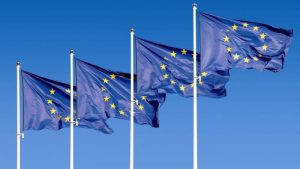
After more than 40 years of operation, DTVE is closing its doors and our website will no longer be updated daily. Thank you for all of your support.
European Parliament committee approves revised audiovisual directive
 The European Parliament’s culture and education committee has approved a ‘trilogue’ political agreement on revision of the EU’s Audiovisual Media Services Directive.
The European Parliament’s culture and education committee has approved a ‘trilogue’ political agreement on revision of the EU’s Audiovisual Media Services Directive.
The committee’s endorsement of the proposals opens the way for a plenary vote in the parliament later this year.
European parliamentary negotiators led by MEP Sabine Verheyen and the Bulgarian presidency of the European Council agreed on a revision of the directive based on the EC’s proposals in June, and the committee’s vote endorses that agreement.
Supporters of the revised directive say that it will create a level playing field by applying rules to internet media services that were previously only applicable to traditional broadcasters.
The revised rules also mean that video-on-demand platforms will have to devote 30% of their catalogue to European productions, while member states will have the power to enforce local content creation obligations on them.
“We have now made European media regulation fit for the digital era by applying similar rules to similar services, whether online or offline. We have finally negotiated a level of protection for internet media services similar to that in place for traditional broadcast media,” said Verheyen.
The revised directive will also determine advertising limits during peak viewing hours and rules to protect children from harmful advertising content, with rules being applied to video sharing platforms for the first time.
“I am happy to say that we have been successful in negotiating that a similar level of protection now also applies to internet media services, as it does to the classical broadcast media services. The transparency rules for advertising, especially on product placement and sponsorship, will now also apply to video-sharing platforms. This is a great achievement for the protection of consumers, especially children and minors. It was our main goal to protect our consumers against excessive advertising,” said Verheyen.
TV and radio sales houses association EGTA gave a cautious welcome to the MEPs’ endorsement of the directive, arguing that the negotiations had delivered flexibility in commercial communications that should result in a more competitive environment. It welcomed the liberalisation of rules on advertising minutes and measures to protect broadcasters’ signal integrity, along with the new responsibilities for video sharing platforms. However, it characterised the net result as “one of modest progress rather than future-proof legislation that reflects market realities”.
Malin Häger, EGTA president, said: “We sincerely welcome the positive progress made on the rules that govern audiovisual commercial communications, particularly with regards to advertising time limitations. However, we must also recognise that on some aspects, the text is less ambitious than we hoped for at the beginning of this process. Broadcasters remain far more heavily regulated than online actors who are competing for the same advertising revenue. In order to provide long-term value, it is therefore crucial that the measures foreseen in the reform are applied and enforced consistently.”
Separately, public service broadcasters’ organisation the EBU has welcomed a separate endorsement by the European Parliament’s industry, research and energy committee of a trilogue deal on the new EU Electronic Communications Code.
The EBU welcomed provisions that will require digital radio sets to be integrated in passenger cars in the EU along with changes to must-carry rules to reflect changes in consumption habits.
“What matters most is that citizens are able to access public service media as easily as possible from the wide range of distribution channels available to them,” said the EBU’s head of EU regulatory policy, Wouter Gekiere.
“The newly agreed EU Code offers modernised rules to improve access by European users to media content through telecoms networks. Such improvements to the regulatory framework will contribute towards supporting media pluralism and cultural diversity in Europe. Ultimately, it will also encourage broadcasters to continue to develop more innovative radio services for EU audiences.”


